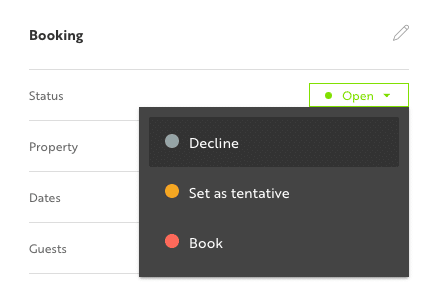For vacation rental owners and property managers who prefer first taking booking requests over instant bookings, there is one task that can make us all feel a bit awkward: declining inquiries. Whatever the reasons are for not accepting a booking request, knowing what to say (if you want to respond) can make the situation a lot easier to handle.
There are many possible reasons you might be inclined or forced to decline a booking inquiry. Maybe it’s not even because of the guest but simply due to scheduling or availability issues. Or perhaps you are genuinely getting a strange vibe from the person who made the request. In that case, of course, you want to protect your property and your business first and foremost.
Especially in the case of Airbnb hosts, there’s an added safety concern because oftentimes they only offer a single room in their own house or apartment. That means they will have to share their own space with a stranger and come in immediate personal contact with them. Thus, it’s certainly in the interest of every Airbnb host to ensure that they only welcome decent and trustworthy guests to their home. As a result, declining booking or reservation requests and inquiries might even be quite a regular occurrence. That is why knowing the right approach in advance will definitely come in handy.
Let’s take a look at the top six best practice tips for declining vacation rental inquiries, as well as some helpful advice from professionals in the field!
1. Be polite
One of the most important things to remember when it comes to declining guests is that you still need to remain courteous, polite and professional – or your vacation rental reputation could be on the line.
It’s not essential to be specific with each guest, you could even write a generalized template for declining inquiries that you can use time and time again.

First, say Thank You for the inquiry and let your guest know that the place is not available for those dates.
After you send the response, you can decline the inquiry and finalize the issue.”
Erinç Arik, Airbnb Host since 2012
No matter the case, always remember to thank guests for their inquiry. If you want to specify the reason why you’re not accepting, feel free. Otherwise, you can prepare something generic that can be used for all your declined bookings, such as:
“Unfortunately we cannot accommodate your booking request at this time. Good luck with your search and wishing you a wonderful vacation”.
2. Be helpful
Sometimes when you read the inquiry, you know straight away that the guest (or group of guests) is unsuitable for your vacation rental – that’s OK. Nobody wants to make the other feel bad in this situation, so there are some things you can do to make declining the inquiry a little smoother.

It is not difficult to deny these things. We encourage dialogue so these things come up. If they do then we simply say that this particular listing would not be suitable and perhaps recommend one we have which is better suited.
If not we wish them well with finding something better to suit their needs. It doesn’t have to be difficult.”
Stuart Lansdale, works at Roomfilla
Perhaps you have other rental owner friends nearby in your area whose home would be a better fit – why not direct these guests onwards to a more appropriate rental? You’ll be helping out a contact by bringing them a new booking, and you’ll stay on good terms with the potential guest in case they come back with a more suitable inquiry in the future.
Maybe the person who made the booking inquiry did in fact already seem like the perfect guest for your vacation rental but you were forced to decline due to a change of your availability. In that case, you could also try to win their goodwill by inviting them to make another request in the future when they return to your city or area.
In doing so you show that person that you would’ve genuinely loved to have them as a guest and are only declining their inquiry due to incidental circumstances. This way you might potentially still secure the booking at another point in time and also make up for the initial decline.
3. Be honest
One of the best ways you can decline an inquiry that doesn’t suit is simply by being honest and being yourself – provided your reasons aren’t going to offend or discriminate against anyone!
After all, this is part of the process that differentiates vacation rentals and hotels – hotels accept all kinds of guests, but as this is your home, you are the only person who has final say on who stays and who doesn’t.

As I like to have a few days off between guests, I usually leave my calendar fully open and see what kind of requests I receive.
A huge part of my requests are couples who want to stay an extended weekend; I often explain to them that I prefer longer stays such as a full week or more. Guests can’t blame you if you’re clearly saying that you’re hoping for a better offer, which they can understand.
Giving them some tips, which neighborhood is best for their stay and wishing them good luck works well too.
Honesty is often the best policy.”
Emmanuel Cabane, Guest, Superhost, Employee @Airbnb
On the whole, people appreciate transparency. There is no need to make up a story to back up the reasons you’re declining a guest. Simply be honest, they will get the message and look somewhere else.
4. Set rules in your description and refer back to them
If your inquirer has mentioned something in their message that specifically contradicts or clashes with what your listing states, make it known that that is the reason you are declining them.
Not only will referring back to your listing help you come across as responsible and fair for having the same terms and conditions for every inquiry, but it will also teach the potential guests to really pay attention and read the listing thoroughly before requesting to book. This will help avoid disappointment on both ends.

We will not accept a reservation from anyone under 25 years of age. We will accept children under 25 only if they are accompanied by a parent or guardian. We will not accept a reservation that includes a pet of any kind. We won’t accept a reservation for more guests than the maximum we list.
We’ve also turned down reservation requests for those who say they do not want maid service and want a lower rate.
Maids not only keep the property in good condition and clean, but they are also a set of eyes and ears in the event that guests plan to do something with the property that we do not allow – for example – they want to have 15 people staying at the property when 8 is the maximum.
If you set your guidelines for the age of the person who makes the reservation and is responsible, if you set a maximum for the number of guests, outline what age for children you will accept, that you will not accept an inquiry that includes a pet and make it clear if your rental is non-smoking, then you should not have a problem when you turn down an inquiry that does not meet your guidelines.
I also recommend that owners require a refundable security deposit and that you have a written rental agreement that has to be signed by the person making the reservation.”
Kathleen Lasater, Owner of vacation rentals in Cozumel, Mexico for 16 years
There is no need to be aggressive in your responses, simply state that “as mentioned in the description, we don’t accept [pets/children/more than 10 guests] so will not be able to accommodate your request this time”.
5. Listen to your gut instinct – it’s your home
Some owners are drowned with guilt after denying a booking request, but others don’t think twice. When it comes down to it, there is no need to feel at fault if you find a booking request to be unsuitable.

Bob Adams, Airbnb host for a number of years
Common sense and gut instincts can also play a big role in this particular kind of decision making – especially when it comes to renting out your home. If something doesn’t feel right about an inquiry, it probably isn’t! And you don’t want to fall victim to a vacation rental scam.

I had a guest once who asked many questions and gave off a bad vibe but I ignored it. When she arrived she thought she got the whole apartment instead of a room and demanded that I get her a private apartment! We had hundreds of guests and no one else ever thought our ad for a room to rent with shared bathroom was for a private apartment to themselves.
Listen to your gut, if it feels off, pass on it. With Wimdu you just don’t accept, you don’t need a reason.”
William Anders, I have much experience with Wimdu and Airbnb
It’s always better to be cautious than to get caught off-guard, even if that does mean accepting one less booking every now and then.
6. If you don’t have anything nice to say…
As the saying goes, if you don’t have anything nice to say, don’t say it at all. Most vacation rental websites and OTAs have simple buttons for answering booking inquiries, so if finding the words to decline an inquiry doesn’t come naturally to you – don’t fret.

So remember to always be polite, helpful, honest, upfront and true to yourself. Otherwise, just hit ‘decline’ and keep things simple. We would like to hear what your personal experience of declining booking inquiries has been like. Do you have a story to tell or advice to share? Feel free to tell us all about it in the comments!


